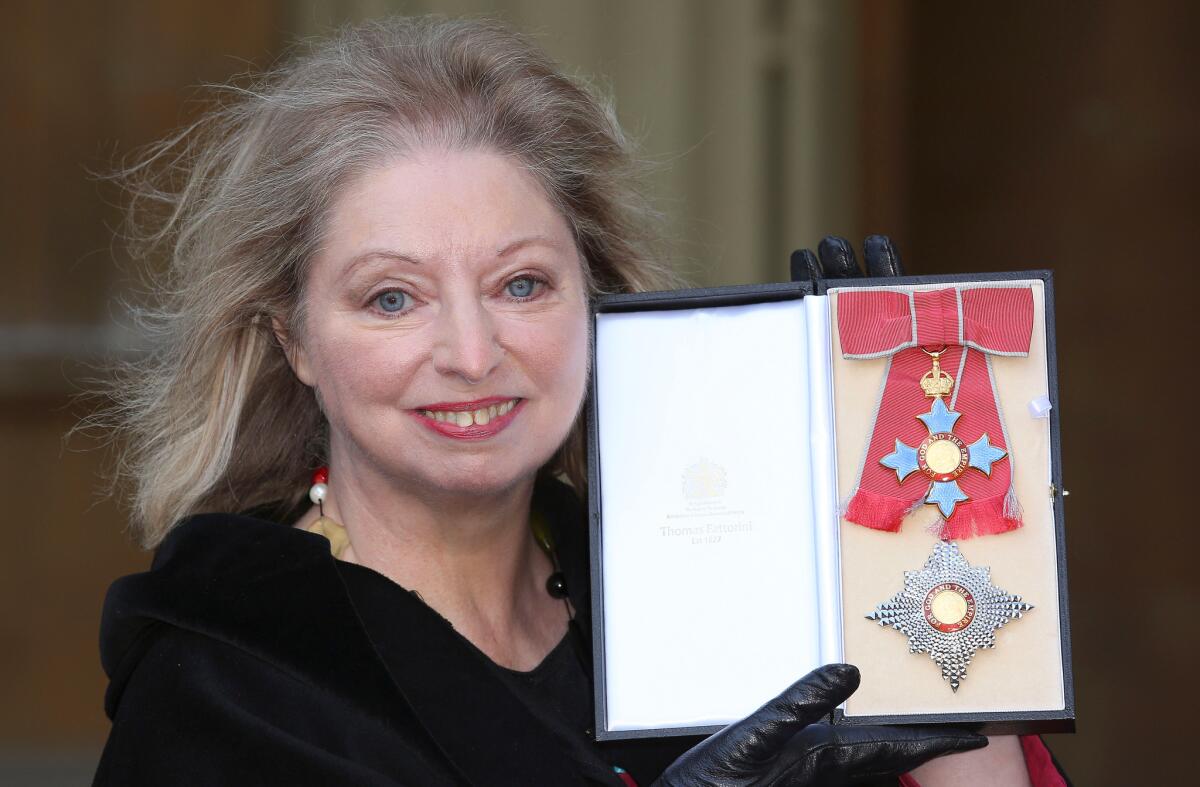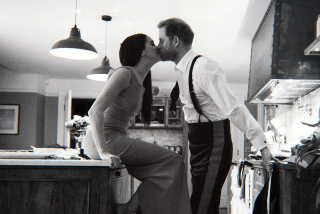Review: Curtains for Cromwell, as Hilary Mantelâs glorious trilogy concludes
In 2009, Hilary Mantel published âWolf Hall,â her first novel in a trilogy about Thomas Cromwell, a blacksmithâs son who became King Henry VIIIâs political fixer, hatchet man and architect of Englandâs religious Reformation. In a feat of literary alchemy, the British author transformed the reviled Cromwell into one of contemporary fictionâs most unforgettable characters. Her second installment, 2012âs âBring Up the Bodies,â a taut and virtuosic piece of storytelling, brought Cromwellâs story up to the moment of the execution of Henryâs second wife, Anne Boleyn. Both books won the Man Booker Prize.
Now comes the final book in the trilogy, âThe Mirror & the Light.â To get on with it, here are some quick answers for Mantelâs many fans: Is it as good as the first two books? Yes. Is it a masterpiece? Yes. Will you grow so attached to the antihero Cromwell (if you werenât already) that you might just weep at the end? Entirely possible.
âThe Mirror & the Lightâ takes up the story on May 19, 1536, seconds after Boleyn has died, her fate engineered by Cromwell, her head cut off by a French executioner. The body is still warm: âbelly down, hands outstretched, it swims in a pool of crimson, the blood seeping between the planks.â Be forewarned that this is a bloody book; the helpful dramatis personae lists âThe recently dead,â and those are just the unfortunates dispatched before the curtain is raised.
Cromwellâs fortunes have waxed as the kingâs third marriage, to Jane Seymour, has blossomed. But Henry is never serene for long, and the inevitable second-guessing begins as the king waits for Jane to deliver him a male heir. England is in turmoil, and as Cromwell oversees the dissolution of the kingdomâs monasteries, the discontented Catholics in the north rebel. Cromwell works night and day to ensure Henryâs survival, and the king rewards him with three of the highest offices of the land. He becomes an archrival to Catholic aristocrats and a vexation to the monarchs of France and the Holy Roman Empire, who believe (with some justification) that Cromwell is a closet Protestant aiming for the complete separation of English Christianity from the Catholic Church. When Jane dies after giving birth, Cromwell is plunged into a search for yet another wife, and the harrowing cycle of diplomacy, double-dealing and royal mind-reading begins again.

This is well-trod territory for novels, works of history, plays and movies and several miniseries â some trash, one unforgettable (the BBC version, starring Mark Rylance as Cromwell, won a Golden Globe). What raises Mantelâs version so high above the others?
Mantel may be unique among modern novelists in her ability to make the past as viscerally compelling as the present. A sensualist, she re-creates an age rife with beauty and dread. The pleasures of a good meal, the flash of cloth-of-gold, the joy of the first crop of plums â the reader is immersed in a more vivid age through Cromwellâs never-miss-anything perspective.
She also plumbs the terrors of superstition and belief, as the ghosts of Cromwellâs friends and victims make regular visits, his old master Cardinal Wolsey hovering in the shadows and his dead nemesis Thomas More sharing his cell in the Tower of London. The appearance of George Boleyn, Anneâs executed brother, brings a prophesy: âAs George had stood, his hands held out, an image had stirred inside him, and he was elsewhere: in some other enclosed space, the light failing, as if a shutter had half-closed. Above him a shadow, like the outstretched wing of an angel, blood in his mouth, and the curve not of feathers but of stone: and a chill, a deep chill in the marrow.â
Mantel has a profound understanding of politics and power, and to that end she delivers savage dialogue. She re-creates the wicked, bawdy humor of the age, and her action scenes rival Shakespeare. She is an intricate and flawless plotter. She pays astute attention to historical detail â who knew that Anne Boleyn was so disregarded that no one built a coffin for her?
But her overriding genius is for characterization. A scheming lady-in-waiting, an insecure assistant ripe for manipulation. A double-dealing diplomat. A monomaniacal king with quicksilver changes of heart and unlimited power and a right-hand man who constantly weighs whether to tell the truth and or simply agree. âNow we live in an age of coercion,â Cromwell thinks, âwhere the kingâs will is an instrument reshaped each morning, as if by a master-forger: sharp-pointed, biting, it spirals deep into our crooked age. You will see Henry, profound in deception, take an ambassadorâs arm and charm him. Lying gives him a deep and subtle pleasure, so deep and subtle he does not know he is lying; he thinks he is the most truthful of princes.â Raise your hand if this sounds familiar.
Thomas Cromwell is the ideal protagonist. He sees everything unflinchingly. He has almost perfect recall, and as a man of âvileâ (common) blood, he has no illusions about the aristocracy. Despite his brutal methods, he has a compassion that his real-life counterpart may have lacked, a deep loyalty to his masters and a determination to take care of those who depend on him. And at bottom, he is a patriot; everything he does is for England, an island nation of barbarians in rebellion against the head of all Christendom, ripe for invasion and domination. Second guessing his role in Anne Boleynâs execution, he asks himself: âWas I just? No. Was I prudent? No. Did I do the best thing for my country? Yes.â
As the brutal game of chess unfolds, thereâs never much doubt about the outcome. âPrinces hate those to whom they have incurred debts,â Cromwell thinks as he awaits his fate. âFavours that cannot be repaid eat away at the soul.â His downfall comes not so much because he fails but because he cannot remain perpetually vigilant and because he is a commoner who flew too high. âDo not join battle with the noble families of England,â one enemy tells him. âYou have lost before you ride out. Who are you? You are one man. Who follows you? Only carrion crows, bone-pickers. Do not stop moving, or they will eat you alive.â
Mantel keeps us with him to the last; you feel that you have to honor his life by attending to his terrifying death. In a coda she quotes Petrarch: âFor you perhaps, if as I hope and wish you will live long after me, there will follow a better age. When the darkness is dispelled, our descendants will be able to walk back, into the pure radiance of the past.â She opens a door to that past, and her readers are rewarded.
Gwinn, a Pulitzer Prize-winning journalist who lives in Seattle, writes about books and authors.
Hilary Mantel
Henry Holt: 784 pages, $30
More to Read
Sign up for our Book Club newsletter
Get the latest news, events and more from the Los Angeles Times Book Club, and help us get L.A. reading and talking.
You may occasionally receive promotional content from the Los Angeles Times.







